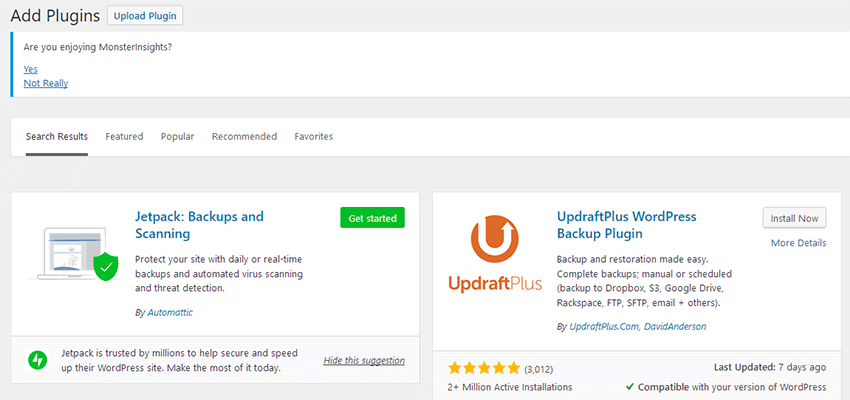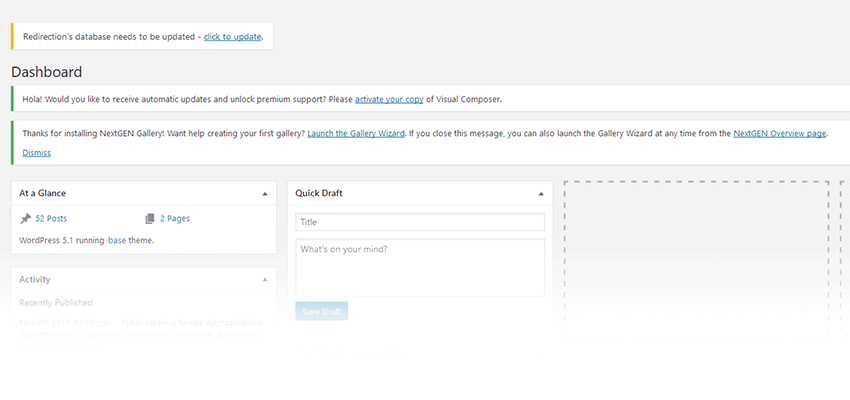There are any number of things to love about WordPress. Chiefly among them is the fact that it’s open source and free to use in any way you like.
For web designers and their clients, this keeps costs down and lowers the barrier to building a first-class website. For plugin and theme authors, it provides an opportunity to tap into and benefit from a large, existing marketplace. Everyone’s a winner, right?
Well, it’s not always that simple. There are times when the various interests who have a stake in WordPress collide with a difference of opinion (see: Gutenberg). And it seems that we’ve hit another one of those points of contention: The WordPress dashboard.
An Unseemly Tactic?
Recently, there’s been some fervor over a “feature” in version 7.1 of Jetpack (since removed, as of version 7.2.1), the venerable Swiss-Army-Knife of a plugin by Automattic (a driving force behind WordPress) that offers a ton of various functionality. The plugin had started to promote its own paid products on the WordPress plugin search screen, placing itself first in line over everyone else.

Funny enough, this did not go unnoticed by members of the community (which likely led to its quick demise). There was fierce debate on Twitter, with Gravity Forms founder Carl Hancock declaring (in a since-deleted tweet), “Automattic is setting the precedence that hijacking plugin search results is an acceptable way to game user discovery problems & outrank competitors.”
While this change created a stir, it’s hardly the first time a plugin (Jetpack included) has forced its way onto our screens. For example, sites with Jetpack installed have been seeing ads for their backup services on the plugin upgrade screen for quite some time.
And they are far from the only guilty party. Plugins both free and commercial are littering the dashboard. Sometimes, it’s just a friendly message regarding a maintenance-related task. More often, they’re asking for donations, reviews, upgrades and various other annoyances. The “good” ones are easily dismissed, the not-so-good ones keep showing up time and again, offering reason enough to stop usage of the product.
Yet, when you take an open piece of software that anyone can tap into, this all seems like it was inevitable.
Looking for an Edge
Like every other industry, the WordPress marketplace is highly competitive. It seems like every theme and plugin has several direct competitors, and everyone is looking to get their product to the front of the pack. Even web hosts have joined in the fun.
And to be blunt, the WordPress dashboard is a prime place to get your message across. It’s a captive audience and one that developers know is interested in their product (because, well, they’ve already installed at least one of them on their site).
For those that offer completely free products, dashboard notifications can serve as a way to gain that extra bit of income that keeps development moving forward. For freemium products with pro versions and other upgrades, it’s a path to keeping site owners in your ecosystem for the long term.
Yes, it can be frustrating to deal with. The messages can often be tacky and much too prevalent (and borderline ridiculous on a Multisite install) – particularly when so many products are utilizing them. But can we really say that we’re at all surprised by this behavior?
Virtually every medium known to man has, at some point, become polluted with similar annoyances. Newspapers, television and radio all have their offenders. Websites have seen all number of intrusive ad gimmicks. So, perhaps our CMS of choice was just next on the hit list.

The Precedent Has Been Set
Sadly, whatever innocence we may have projected onto WordPress is long gone. It may be a free tool, but it’s used by many of us to, in one way or another, make money. As such, there are going to be people who are looking to take advantage of the platform – both on the front and back ends – to grab that extra attention and cash.
What can we do about it? Well, we might get away with avoiding some of the worst offenders in this area. Although, that’s not necessarily going to be good for the functionality of our sites. Unfortunately, the more products that start using these tactics, the more compelled others will be to follow that same path.
Another option is to get in touch with developers and tell them that you don’t appreciate the constant messaging. Sweeping changes across the industry may not happen immediately, but we can try to influence people one at a time (it seemed to influence Jetpack’s change of heart). The hope is that the practice eventually becomes so frowned upon, developers don’t dare tread there in the future.
It could also be that niche plugins, such as Disable admin notices individually, will become must-have additions for those who spend a lot of time working within WordPress. Much like adblocker software has become a big deal in the browser world, a similar industry may (excuse the term) pop up to try and save us from CMS-related aggravation.
Beyond that, it’s a matter of deciding what we are (or aren’t) willing to put up with. WordPress still does amazing things and is a driving-force behind plenty of careers. So, maybe this is just a small price to pay in order to stay in the game. Ultimately, that’s something for each of us to decide.
Related Topics
Top